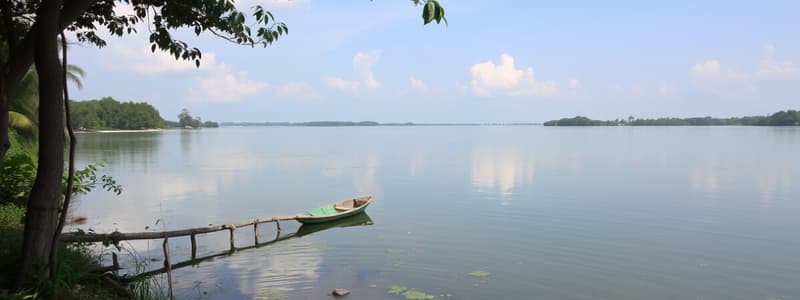Podcast
Questions and Answers
What is the definition of a specimen in the context of CITES?
What is the definition of a specimen in the context of CITES?
A specimen is an animal or plant, alive or dead, or any readily recognizable parts or derivatives of species.
List two examples of animal parts that may be considered specimens under the CITES regulations.
List two examples of animal parts that may be considered specimens under the CITES regulations.
Examples include skins and bones.
Why is defining trade as export, import, and re-export important in the context of wildlife management?
Why is defining trade as export, import, and re-export important in the context of wildlife management?
It ensures that all forms of movement of specimens are regulated to prevent unsustainable exploitation.
What are the implications of high levels of exploitation of certain animal and plant species?
What are the implications of high levels of exploitation of certain animal and plant species?
What role do treaties play regarding the trade of wildlife species that aren't endangered?
What role do treaties play regarding the trade of wildlife species that aren't endangered?
What significance did Tasik Bera gain in 1994?
What significance did Tasik Bera gain in 1994?
What key functions does Pulau Kukup provide for the mainland town?
What key functions does Pulau Kukup provide for the mainland town?
When was the Sungai Pulai Forest Reserve gazetted, and what makes it ecologically important?
When was the Sungai Pulai Forest Reserve gazetted, and what makes it ecologically important?
What attractions and facilities does Tanjung Piai offer for eco-tourism?
What attractions and facilities does Tanjung Piai offer for eco-tourism?
What is notable about Lower Kinabatangan Segama Wetlands in terms of its RAMSAR designation?
What is notable about Lower Kinabatangan Segama Wetlands in terms of its RAMSAR designation?
Flashcards are hidden until you start studying
Study Notes
RAMSAR Sites in Malaysia
- Tasik Bera was designated as Malaysia's first RAMSAR site in 1994, recognized for its ecological significance.
- Pulau Kukup serves as a natural barrier for flood protection, storm protection, and shoreline stabilization.
- Sungai Pulai Forest Reserve and Tanjung Piai both recognized on January 31, 2003, emphasize ecosystem diversity by supporting mangroves and intertidal habitats.
- Kuching Wetland National Park gazetted in July 2002, became a RAMSAR site in November 2005 highlighting its wetland features.
Biodiversity and Conservation
- Lower Kinabatangan Segama Wetlands is recognized as Sabah's first and Malaysia’s largest RAMSAR site as of COP10 in 2008.
- The wetland areas support crucial species for biodiversity, including endangered flora and fauna.
- Conservation efforts aim to manage wetland ecosystems sustainably, balancing ecological, educational, and recreational needs.
Specimen Definition and Trade
- A specimen includes any part or derivative of a plant or animal; this encompasses live specimens and identifiable parts such as skins, bones, and shells.
- Trade definitions categorize transactions as export, import, and re-export, facilitating international wildlife trade governance under CITES.
Trade Regulations and Certificates
- Re-export certificates ensure the legality and proper compliance of traded specimens with international conventions.
- Certificates may also apply to special cases like captive-bred species and traveling exhibitions, ensuring traceability and responsible trade.
Importance of CITES
- CITES regulates international wildlife trade to assure sustainability and prevent species endangerment.
- Strong partnerships with global conservation frameworks enhance protection strategies for endangered species and ecosystems.
Ecosystem Services of Wetlands
- Wetlands provide essential services like food supply, water purification, flood control, and storm protection, highlighting their critical role in sustaining human life and environmental health.
- These ecosystems also contribute to recreational opportunities and biodiversity preservation.
Other Effective Area-Based Conservation Measures (OECM)
- OECMs aim to conserve vulnerable ecosystems outside protected areas and include engagement with local communities for effective conservation outcomes.
- Successful OECMs contribute to aligning conservation practices with Sustainable Development Goals (SDGs) and enhancing landscape-based biodiversity management.
Example of OECM in Malaysia
- Benus Bird Camp located in Kg. Gol, Pahang exemplifies an effective area-based conservation measure aimed at protecting local biodiversity while fostering community involvement in conservation efforts.
Studying That Suits You
Use AI to generate personalized quizzes and flashcards to suit your learning preferences.




